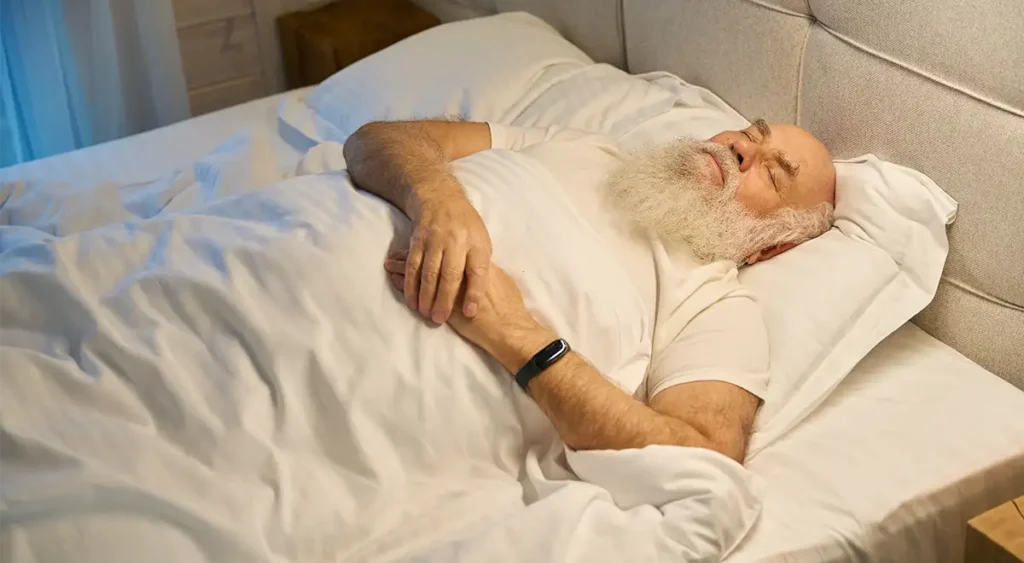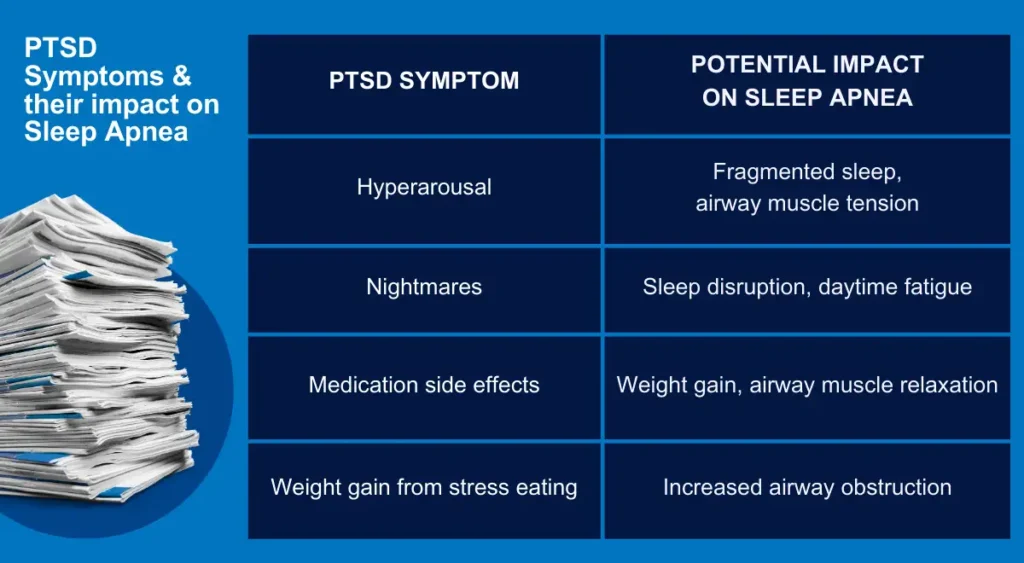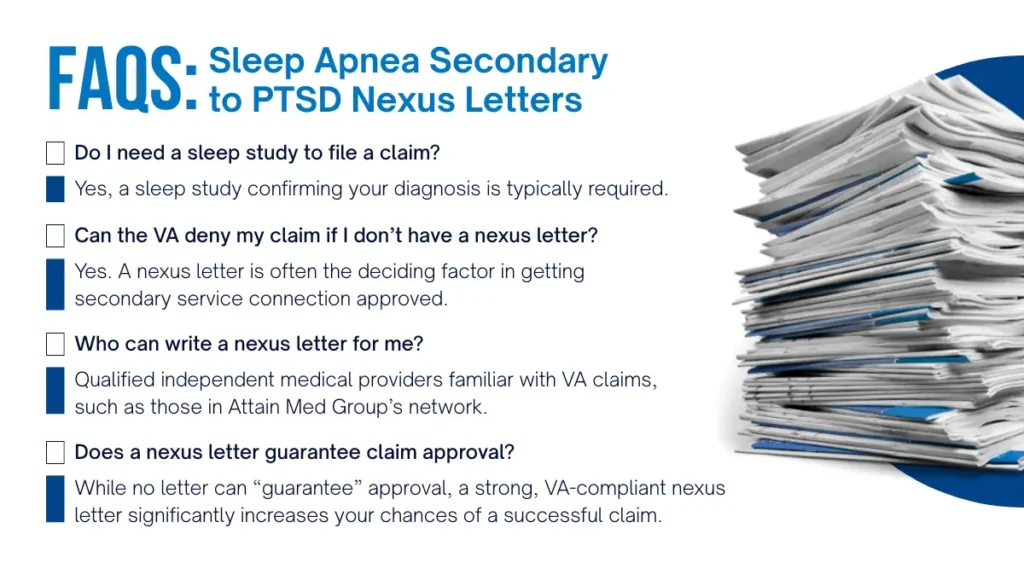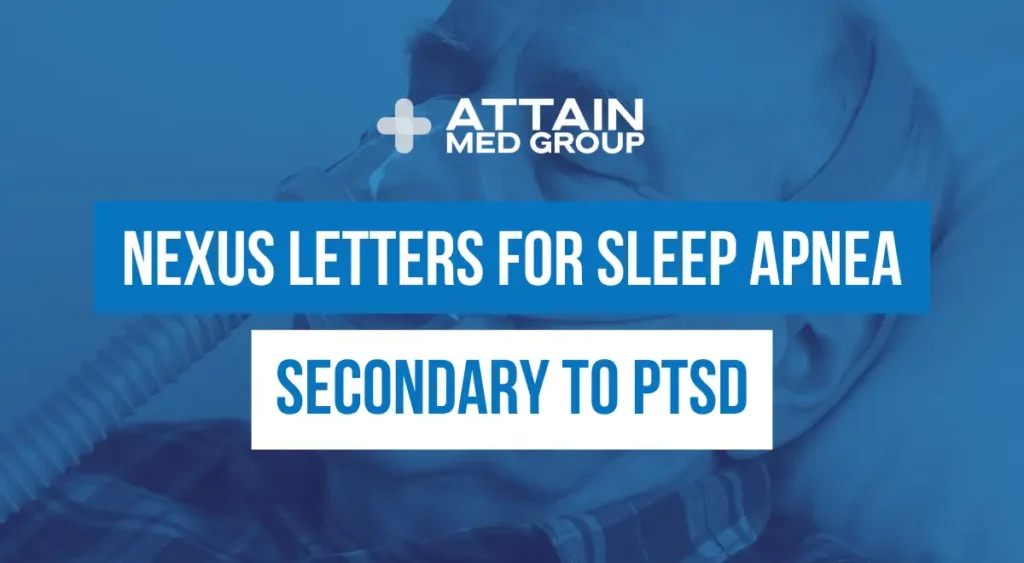Many veterans suffer from sleep apnea and PTSD, but few realize these conditions are often linked—and that this connection can qualify you for additional VA disability compensation. If you’re searching for “sleep apnea PTSD nexus letter,” you’re on the right path to strengthening your claim.
At Attain Med Group, we specialize in providing expert, VA-compliant nexus letters to help veterans prove this connection, using clear medical rationale backed by current research and VA claim requirements.
What Is a Nexus Letter?
A nexus letter is a detailed medical document prepared by a qualified provider that connects a veteran’s secondary condition (sleep apnea) to a primary service-connected condition (PTSD). This letter is essential for VA claims where the connection is not automatically presumed and must be proven with medical evidence.
Without a strong, medically justified nexus letter, claims for sleep apnea secondary to PTSD are often denied.

Why PTSD Can Cause or Aggravate Sleep Apnea
Understanding the Link Between PTSD and Sleep Apnea
Post-Traumatic Stress Disorder (PTSD) is more than a psychological condition; it impacts your entire nervous system, hormonal balance, and sleep architecture. These changes can directly contribute to the development or worsening of obstructive sleep apnea (OSA), which is why so many veterans face both conditions simultaneously.
Here’s how:
✅ Hyperarousal and Fragmented Sleep
PTSD often causes hyperarousal (constant “fight or flight” readiness), leading to:
- Difficulty falling asleep and staying asleep.
- Frequent awakenings throughout the night.
- Heightened muscle tension, which can affect breathing during sleep.
This fragmented sleep increases fatigue and can worsen OSA symptoms by disrupting normal respiratory patterns.
✅ Increased Weight Gain Due to Cortisol Dysregulation
PTSD is linked to chronic stress and elevated cortisol levels, which:
- Increase cravings for high-calorie foods.
- Slow down metabolism.
- Promote abdominal weight gain, which adds pressure around the neck and airway during sleep, making airway collapse more likely.
✅ Medications That Can Exacerbate Airway Collapse
Veterans with PTSD are often prescribed:
- Sedatives or sleep aids (e.g., benzodiazepines, certain antidepressants).
- Medications that relax muscle tone.
These can reduce airway muscle tone during sleep, increasing the risk of obstruction, especially when combined with other risk factors like weight gain and fragmented sleep.
✅ Physiological Changes in Breathing Patterns
PTSD may lead to nightmares and panic during sleep, causing irregular breathing patterns that can destabilize the airway, contributing to hypoxia and worsening OSA symptoms.
What the Research Says
Multiple peer-reviewed studies and VA-backed research confirm the connection between PTSD and OSA:
📌 Sleep Medicine Reviews (2018)
Found that veterans with PTSD have a significantly higher prevalence of obstructive sleep apnea than those without PTSD, underscoring the medical reality of this link.
📌 Journal of Clinical Sleep Medicine (2016)
Documented that hyperarousal associated with PTSD contributes to upper airway instability, a key factor in the development and worsening of OSA.
📌 VA Research Currents (2020)
Reported that veterans with PTSD are at an increased risk for sleep apnea, with OSA severity often correlating with PTSD symptom intensity.

Why This Matters for Your Nexus Letter
Your nexus letter for sleep apnea secondary to PTSD should reference these recognized medical pathways and research findings to strengthen your VA claim. A credible nexus letter will:
✅ Clearly explain how your PTSD has contributed to or aggravated your sleep apnea using documented medical mechanisms.
✅ Cite relevant studies, demonstrating the connection is not speculative but grounded in accepted medical research.
✅ Provide clear, VA-compliant language tying your current sleep apnea diagnosis directly to your service-connected PTSD.
By grounding your claim in evidence-based medical rationale, you significantly improve your chances of receiving service connection and the benefits you deserve.
Why VA Claims for Sleep Apnea Secondary to PTSD Are Denied Without a Nexus Letter
Many veterans are surprised when their claim for sleep apnea secondary to PTSD is denied, even though they have clear diagnoses for both conditions. The reason is simple: the VA requires specific medical evidence to prove the connection, and it will not assume sleep apnea is caused by PTSD without it.
What the VA Requires for Secondary Service Connection
To approve sleep apnea secondary to PTSD, the VA requires three key elements:
✅ A Current Diagnosis of Sleep Apnea
Your diagnosis should be recent and confirmed by a sleep study (polysomnography). Self-reported symptoms like snoring or daytime fatigue are not enough. The VA requires objective evidence showing you meet the clinical criteria for obstructive sleep apnea (OSA) or central sleep apnea (CSA).
✅ A Primary Service-Connected Condition (PTSD)
You must already have PTSD recognized as a service-connected disability with an official VA rating.
✅ Evidence Linking the Two Conditions
This is where most claims fail. You need medical evidence showing that your sleep apnea is “at least as likely as not” caused or aggravated by your PTSD.
How a Nexus Letter Helps Your VA Claim
A properly prepared nexus letter for sleep apnea secondary to PTSD should:
✅ Reference your medical and service records to confirm your PTSD diagnosis and symptoms.
✅ Provide a current diagnosis of sleep apnea.
✅ Use the VA’s “at least as likely as not” language to establish the connection.
✅ Include clear medical rationale and citations to relevant research explaining how PTSD can contribute to or worsen sleep apnea.
What a Strong Sleep Apnea PTSD Nexus Letter Looks Like
Your nexus letter should:
✅ Be written by a licensed, credentialed medical professional familiar with VA claims.
✅ Clearly explain how your PTSD symptoms (hyperarousal, nightmares, medication side effects, weight gain) contribute to your sleep apnea.
✅ Cite supporting medical literature to strengthen the rationale.
✅ Be signed with the provider’s credentials, license number, and contact information.
Real-World Example
A Marine Corps veteran with service-connected PTSD develops severe obstructive sleep apnea, requiring CPAP therapy. He files a secondary claim without a nexus letter, and the VA denies the claim, citing “no evidence of connection.”
After contacting Attain Med Group, the veteran receives a detailed nexus letter referencing:
- His service-connected PTSD and its documented symptoms.
- His sleep study results diagnosing obstructive sleep apnea.
- Research linking PTSD and OSA.
- A clear statement: “It is at least as likely as not that the veteran’s obstructive sleep apnea is approximately due to or aggravated by his service-connected PTSD.”
On appeal, the veteran’s claim is approved, increasing his VA disability rating and compensation.



Why Choose Attain Med Group for Your Nexus Letter?
At Attain Med Group, we:
✅ Provide expert, VA-compliant nexus letters tailored to your medical history.
✅ Reference current peer-reviewed studies and VA standards.
✅ Use clear “at least as likely as not” language with detailed medical rationale.
✅ Help veterans maximize their VA disability claims efficiently and ethically.
As a veteran-owned, veteran-centered company, we are committed to helping you secure the benefits you have earned.
Ready to Strengthen Your Sleep Apnea Secondary to PTSD Claim?
If you believe your sleep apnea is connected to your PTSD, don’t leave your benefits to chance.
Contact Attain Med Group to obtain a trusted, evidence-based nexus letter that can strengthen your VA claim and increase your chances of approval.


